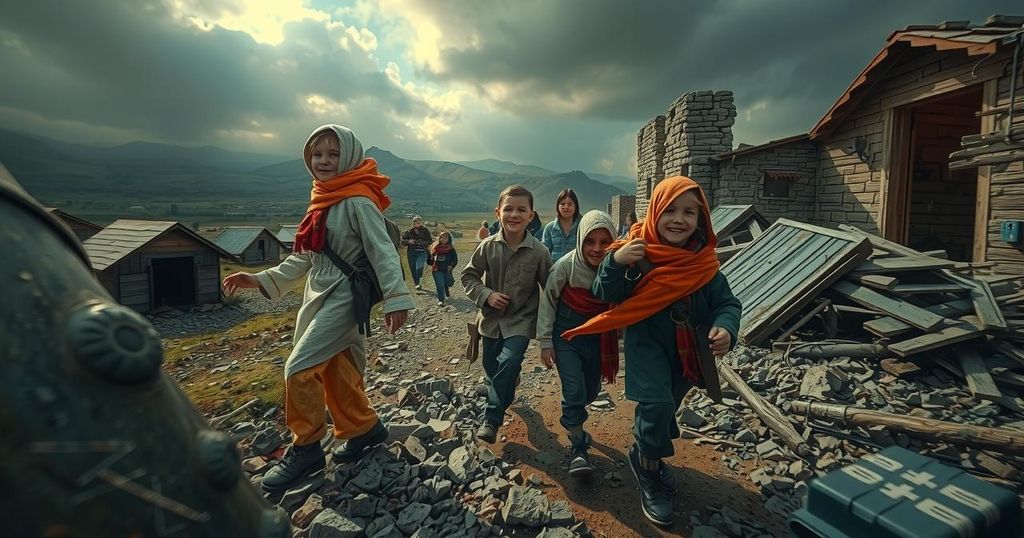Sudan’s Civil War: A Humanitarian Crisis Affecting Millions of Children
The civil war in Sudan has resulted in nearly five million displaced children like Mahmoud, who face severe hunger and violence. With famine declared in some areas and rampant sexual violence, the humanitarian crisis is urgent. UN humanitarian chief Tom Fletcher emphasizes the need for immediate assistance as the global community struggles to address the needs of the Sudanese people amid logistical challenges and ongoing conflict.
In Sudan, children like 13-year-old Mahmoud represent the plight of millions affected by a devastating civil war. Orphaned and displaced multiple times, Mahmoud and nearly five million other children are among the victims of an escalating humanitarian crisis characterized by extreme hunger and violence. Famine has been declared in some regions, while many others face starvation. UN officials, led by humanitarian chief Tom Fletcher, have emphasized the urgent need for assistance, with over half of Sudan’s population—about 25 million people—requiring immediate support.
Fletcher’s visit aimed to shed light on Sudan’s dire situation amidst other global crises, like those in Gaza and Ukraine. He visited Maygoma orphanage, housing approximately 100 vulnerable children in the aftermath of escalating violence between the army and Rapid Support Forces (RSF), which began in April 2023. The conditions are dire; Mahmoud’s wish to become a governor reflects a longing for stability and the desire to rebuild a war-torn nation.
Efforts to deliver aid are fraught with challenges. Recently, Gen Abdel Fattah al-Burhan granted the UN permission to utilize more regional airports for humanitarian assistance, marking a potential breakthrough in logistics. The World Food Programme is keen to reach communities trapped by violence, particularly those in Darfur’s Zamzam camp. However, the situation remains perilous, with starvation increasingly weaponized in this conflict—both against opposing factions and the civilian population.
During his visit, Fletcher underscored the alarming rise in sexual violence, described as an epidemic by the UN, and called for enhanced approaches to combat gender-based violence. Engaging with local aid leaders, such as Romissa, who emphasized the necessity for Sudanese unity, Fletcher reiterated the importance of local involvement in recovery efforts. Meanwhile, grassroots initiatives like the Shamaa safe house provide critical support to women and children suffering from violence, yet the burden of providing care is overwhelming.
As the conflict rages on, the indomitable spirit of the Sudanese people shines through their efforts to support one another. The humanitarian response may be impeded, but voices like Mahmoud’s highlight the desperate need for peace and healing.
The ongoing conflict in Sudan has resulted in widespread displacement and humanitarian suffering. Over four million children have been forcibly displaced due to violence stemming from a power struggle between the Sudanese army and the paramilitary Rapid Support Forces. As the conflict progresses, food scarcity and health crises intensify, prompting international aid agencies to become involved. However, logistical challenges hinder the effective delivery of assistance in the conflict zones, where bureaucratic barriers often complicate operations. Amidst these tribulations, local leaders and citizens play an essential role in providing care and support, embodying the resilience of the Sudanese people during their greatest challenges.
The civil war in Sudan presents one of the most severe humanitarian crises globally, with millions of children displaced and suffering from acute hunger and violence. The role of international organizations, while critical, remains fraught with complications due to the complex political landscape. Local voices stress the need for community cohesion and resilience, underscoring the importance of grassroots efforts in the face of despair. The plight of the Sudanese people, vividly illustrated by the experiences of individuals like Mahmoud, demands urgent attention and action in pursuit of peace and recovery.
Original Source: www.bbc.co.uk




Post Comment